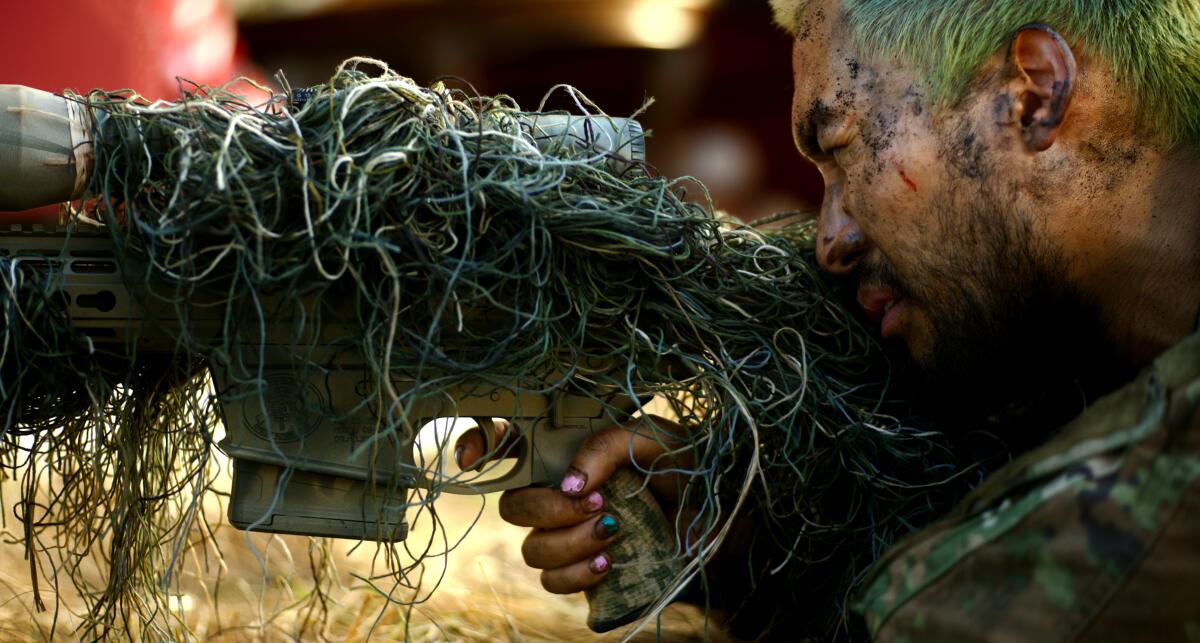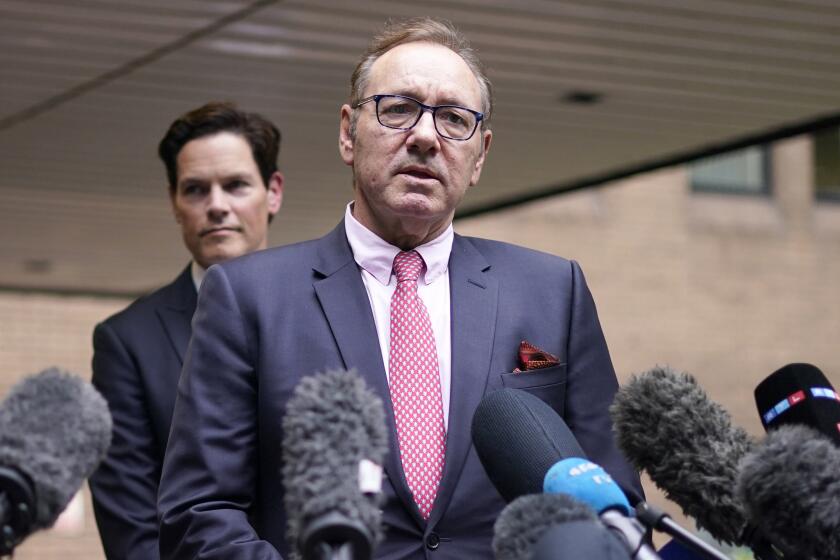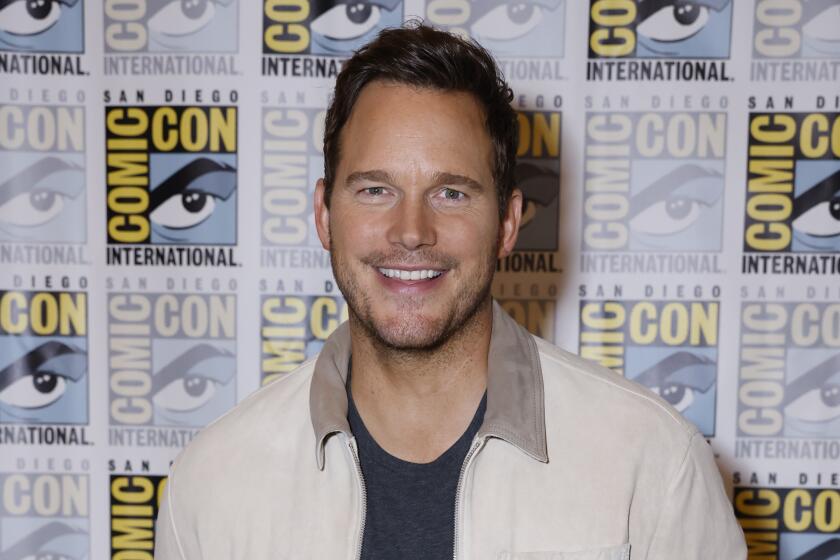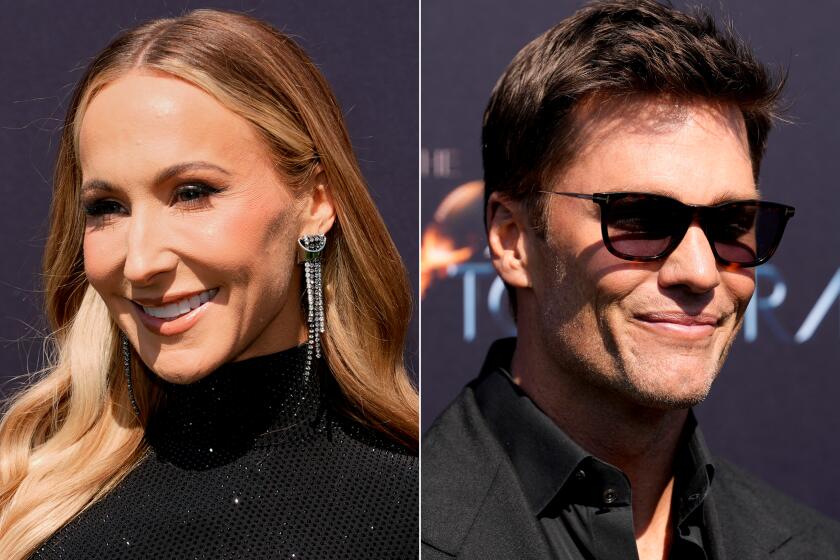In trying to hedge its politics, ‘Civil War’ betrays its characters — and the audience

Director Alex Garland is out to prove that you can make a movie about a modern American civil war without getting political. And he wants to do it in an election year.
The question is: Why?
His new film “Civil War,” which opened Friday, follows an unlikely group of journalists as they make their way from New York to Washington, D.C., as the rebel “Western Forces,” made up of California and Texas, close in on the capital. Two of those journalists — Lee (Kirsten Dunst), a legendary conflict photographer, and Joel (Wagner Moura), a writer — hope to secure the final interview and image of the sitting president of the United States (Nick Offerman) when they arrive, before the commander in chief is dragged from office and killed.
Battle lines force the group to take a circuitous route, along which they encounter the terrible, often random violence that has taken hold of the country amid the internecine conflict.
It is a powerful film, which Garland has said he made to underscore the importance of journalism: to remind us that much of what we know about the world is a direct result of journalists telling and showing us what is going on at any given moment. Even if their lives and/or mental health are at stake.
This is an admirable and important goal, particularly at our own historical moment. But “the Western Forces”? What now?
As many noted from the moment the “Civil War” trailer dropped, it’s tough to get invested in the problems of four little people when you’re busy trying to imagine what set of circumstance — beyond, say, an alien invasion — would forge an alliance between California and Texas, and precipitate a second breakaway faction identified as “the Florida Alliance.”
Especially one that puts these states at odds with the president and, presumably, whatever remains of the U.S. Army.
I guess the people fighting on the president’s side are what remains of the army; it’s not exactly clear.
With a deeply disturbing turn by Jesse Plemons, one scene in “Civil War” encapsulates the film’s combustible political balancing act. It almost didn’t happen.
Much is not clear in “Civil War.” This is intentional. Garland is not interested in exploring the reason the Western Forces came together to attack the White House beyond alluding to the social currents that might make a modern civil war possible: racism, nationalism, isolationism, apathy.
But social currents don’t start a war; organized and opposing armed forces do. We never learn the cause of the conflict, the ideology of the president or any of his policies beyond his reliance on the mechanisms of authoritarianism: He’s killed reporters, bombed American citizens, disbanded the FBI and, given that he’s serving his third term, probably suspended the Constitution.
Nor do we discover what the Western Forces and the Florida Alliance hope to achieve by overthrowing him — we assume they are fighting for democracy, but that could just be wishful thinking.
Instead, the film focuses on the resolute nature of the four main characters — formidable Lee; her young, eager and initially unwanted acolyte, Jessie (Cailee Spaeny); thrill-addicted Joel; and Sammy (Stephen McKinley Henderson), the aging correspondent who’s seen it all.
They are a compelling band, expertly played and welded together by the belief that their job is to not to judge what they encounter but to record it for the enlightenment of others.

Their “objectivity” is so thorough that they apparently have no interest in context or meaning, namely the obviously cataclysmic series of events that led to this moment. There’s little discussion of what Joel wants to ask the president upon finding him or what purpose such an interview would serve beyond being his last. (To be fair, things have devolved to the point where no news outlet appears to be worried about scoops or page views; Lee and Joel are merely hoping to document history.)
Despite spending hours in the car viewing one apocalyptic scene after another, none of our heroes are moved to consider moments when all this might have been avoided or to contemplate the nation’s future: Do the Western Forces have a plan beyond the president’s removal? Is there an acceptable vice president or speaker of the House waiting in the wings? Does Congress even exist? Who is leading the Western Forces anyway?
And how can Lee and Jessie’s families, not to mention a shopgirl in a town the team passes through on their journey, manage to keep pretending that “none of this is happening”?
“Civil War” is essentially a road movie. Its tone is not so much apolitical — Garland is clearly antiwar — as post-political. When the group finds itself in the middle of a firefight at a Christmas village, they ask one of the soldiers they meet there, one wearing camouflage and brightly dyed hair, what’s going on.
Someone is shooting at us, he answers. And that is that.
The film attempts to keep the audience in the characters’ road-trip bubble — despite being on a journalistic mission, they are apparently too exhausted and overwhelmed to think about anything but the next set of potential dangers. As one appalling sight follows another, though, it seems irresponsible not to wonder, and keep on wondering, what exactly the hell happened.
And why is no one talking about it?
Writer-director Alex Garland’s controversy-courting political fable about a violently divided America brings together two generation-defining actors.
Very quickly, Garland’s refusal to explain comes to seem less an artistic choice than an ill-considered dodge, like Nikki Haley initially refusing to identify slavery as the cause of the actual Civil War. Particularly given how much of the film’s imagery evokes recent events, including the Jan. 6, 2021, attack on the Capitol.
Strains of fascism, on the right and on the left, existed in America long before the rise of MAGA Nation. But in the wake of Jan. 6, and with Trump’s violent rhetoric once again on full display as he campaigns to return to the White House, it’s impossible not to see “Civil War” as a cinematic vision of what could happen should Trump succeed.
In which case it seems worth noting that the defenders of Trump’s authoritarian tendencies have an clear set of ideologies. (The film’s most horrifying scene, an echo of the celebration of “real Americans” so popular with right-wing Republicans, is presented as an independent act, possibly disconnected from what’s been happening in the halls of power or on the front lines. In real life, the “us vs. them” hostility of white supremacy has an identifiable political home.)
Forcing the very real political divisions that plague this nation into vague subtext doesn’t even serve the purported pro-journalism nature of “Civil War.”
By attempting to keep his film “above” the current political fray, Garland comes close to the both sides-ism that too many journalists are expected (or have chosen) to embrace in an attempt to prove lack of bias. But the arbitrary demand for “balance” should never be confused with objectivity, which requires, among many qualities, an understanding that not all things are equal in importance, relevance or, if it comes to that, blame.
The fact that we are, in many ways, still fighting the actual Civil War, including recent conflicts over how slavery, the Confederacy and war itself should be portrayed in classrooms, history books and civic life, proves how important it is to understand how events, ideologies and people sparked that cataclysm — or any cataclysm. By suggesting instead that anything (or nothing) could lead to the collapse of a nation, the destruction of its most iconic landmarks and the removal of the president by force, “Civil War” does an injustice to its audience, and to the work of the very people it hopes to honor.
Ignorance is not the same as objectivity either.
More to Read
Only good movies
Get the Indie Focus newsletter, Mark Olsen's weekly guide to the world of cinema.
You may occasionally receive promotional content from the Los Angeles Times.









